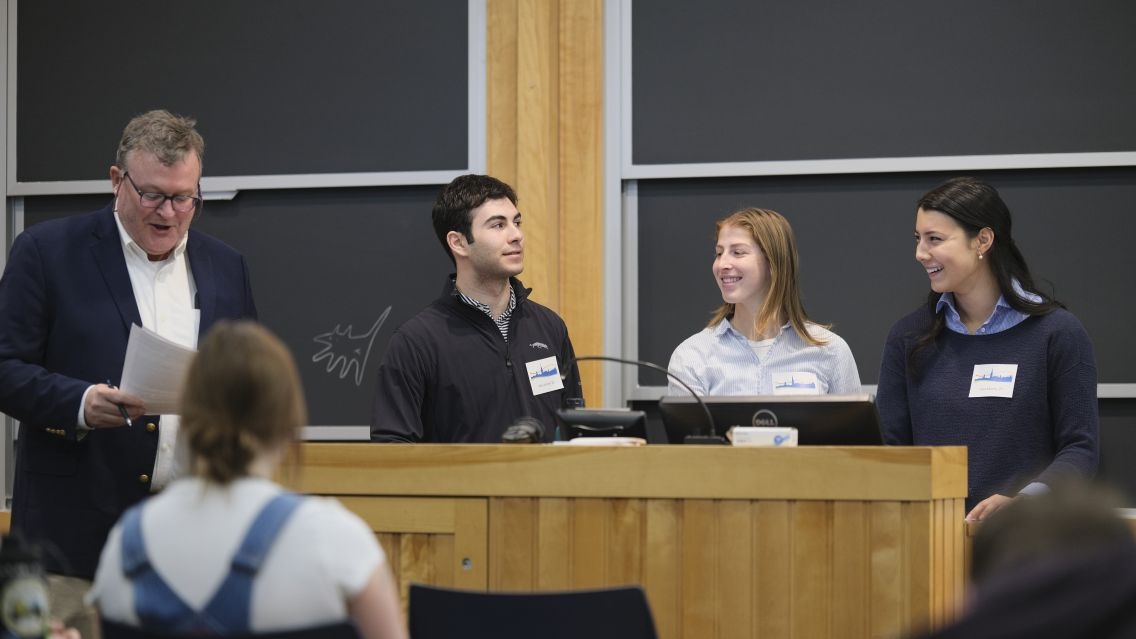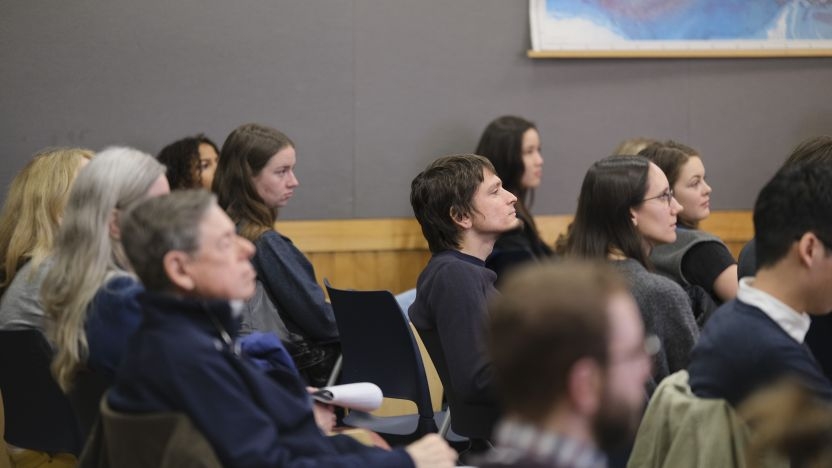Data in Action: Statistical Consulting Students Make Change
Every spring semester, the Department of Mathematics and Statistics offers a course called Statistical Consulting, a capstone seminar that brings real-world problem-solving to the student experience. This academic community connected course, one of 14+ offered at Middlebury College each year, exemplifies how embedding civic engagement into the classroom can support learning and yield powerful outcomes for both students and community partners.

Professor of Statistics Alex Lyford taught the Statistical Consulting course this past spring, matching student groups with community partners to help create solutions that required statistical and technical data analysis techniques. CCE Communications Fellow, Tayyaba Ahktar ‘25, sat with Professor Lyford to learn more about the course, the off-campus impacts of these academic connections, and how they prepare students for life after college. Below is a snapshot of that conversation, followed by reflections from three of the student teams who presented their work in the 2025 Spring Symposium.
Q: Why do you feel it is important to create a community-connected senior seminar for all the STAT majors?
Alex Lyford: On a personal level, I have spent my time becoming educated, learning a set of tools. I feel this desire, maybe this conviction, to give back to the community that I live in. And I try and instill in my students that it’s important that you’ve come to this awesome school. You’ve learned a bunch of stuff. Now you owe it to the community to give back in some meaningful way. You’ve spent– for basically all these students–four years living here. And there are these community members who could greatly benefit from some of the knowledge that you’ve gained while they’ve been working [in] direct service, giving to the community, and they need someone to take the reins on these kinds of assessments. I think my students would agree that there’s this sense ofowing it to the community to do something positive for them.
Q: How are these collaborations formed between the students and the community partner?
Alex Lyford: For this class, I have all of our community partners record five-minute videos introducing themselves as a person, their organization, and the proposed project. Then I have students watch all the videos and basically rank them, and also tell me a little bit about who the students are and what their goals are. I try to match students to community partner projects in a way that complements their skills or interests. If I know that a student wants to go into the nonprofit sector and they want to work on gender pay-gap issues, I will make sure that they know ‘Hey, I have a community partner who’s interested in that.’
So it’s a combination of me getting to know my students really well and our community partners submitting a bunch of information and trying to pair it up in a way that students are building on their strengths and working in a situation that they’re legitimately passionate about working with.
Q: Can you talk about the kind of student learning that comes from these community connections?
Alex Lyford: A lot of students don’t really know anything about Vermont outside of, I’m not even gonna say Middlebury, but campus. Maybe Burlington, which is where they go sometimes…[Students] learn things like, oh, I actually know a lot less about my community than I thought. And so I think there’s value in that. But I think there’s also a value in understanding impact. I think a lot of what students do in the classroom and maybe a lot of what they’ve done up until now feels very set apart… And so one of the values I try to instill is the things that you do in this course are going to have an impact, positive or negative. You screw something up, they might lose their grant or not get their federal funding. And now, there’s this idea of ‘how do I take what I’m doing and understand the direct effect and the actionable things that are going to come from this, and how do I make decisions based on impact’. And so learning, ‘how do I bring value and utility to these community partners in a way that they can make sense of?’
Q: How does the course prepare students for life beyond Middlebury?
Alex Lyford: My honest, biggest answer is we spend so much time talking about how to communicate with people who are really smart and good at what they do, but do not understand the technical aspects of what [the students] are doing. In class and in our weekly meetings, we spent so much time talking about how do I craft an email? How do I respond when somebody says something I respectfully disagree with?
One of the biggest takeaways from this course, aside from some of the technical aspects, is how do I take something that someone is saying, translate it into something actionable, and communicate it in a way that’s respectful, but also stands up for what [the student] believes in and how they truly feel. And to not just like back down and just acquiesce. But also to not step over them and tell them what they should be doing with their own agency.
For the statistics major, this is the senior capstone course. You have to go through this course […]. I think this is pretty rare where you see a project from inception all the way through to completion and are partnered with someone external.
Q: Is there something about this course that you wanted to add?
Alex Lyford: This course literally wouldn’t exist without the CCE. I’ve helped build up these partnerships but I started from nothing… Students want to take this kind of course. And I would love to be able to offer either this course more often or maybe small-scale one-off partnerships here and there. If you’re hearing a community partner who has some questions, thoughts, or challenges related to data, statistics in any way, I would love it if you connected us so that we can continue to build these partnerships. It’s the most fulfilling part of my job, and I want to believe it’s one of the most fulfilling experiences for our students.
Statistical Consulting Partnerships and Student Reflections

The Vermont Futures Project is a non-partisan organization that aims to inform policy decisions using data.The student team worked closely with Executive Director Kevin Chu to extend a state-level analysis of the economic problems affecting Vermont by examining county-level data, providing a more nuanced analysis that will inform policy decision-making.
We all have a pretty specific skillset and coding and data analysis that we’ve learned from doing the major here […] but now we get this great opportunity to really share our work with non-technical people… So yeah, I think we brought a lot of skills to the project, but we’re also really learning how to apply them outside of the classroom.
I think just being part of a project where it has the potential to really have a concrete impact on Vermont makes our work meaningful.
Since 1987, Vermont Works for Women has worked to advance equity and access to opportunities that allow women, girls, and people of all identities in Vermont to thrive economically. The student team provided analysis of data in areas such as the gender pay gap and occupational segregation, and developed tools to better showcase the significance of the organization’s work and the positive impact it has on Vermont communities.
I’ll be joining the technology industry as a software engineer, which is an occupation that’s pretty much male-dominated. The project reinforced the idea that women still need more representation in these industries, and it’s gonna prompt me to either join some women mentorship program or take some other steps that would benefit women and bring more women into this predominantly male field.
Champlain Valley Office of Economic Opportunity (CVOEO) addresses economic, social, racial, and environmental justice issues impacting Vermonters and works with individuals and families to achieve economic independence. The student team worked with CVOEO to redesign their community needs assessment, analyze their data, and create a new and improved app to present and visualize that data.
The level of respect and trust that we had between CVOEO, us, and our professor was really important. CVOEO did not treat us like we were students. They truly did treat us like we were statistical consultants. They refer to us as their business partners. They would talk to us not as students, but more so as their equals. And that was a really nice relationship to have.

